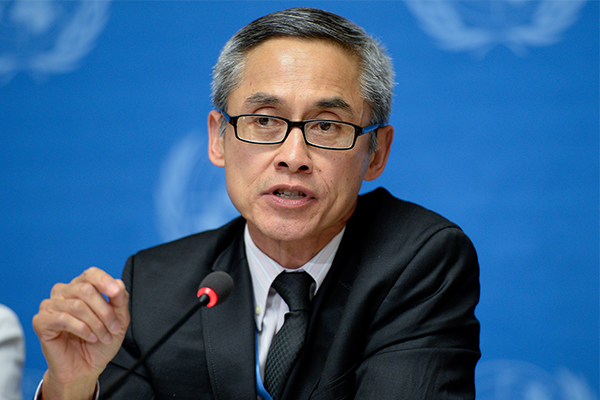During an Interactive Dialogue at the Human Rights Council last week, the UN’s first expert mandated to combat and protect against violence and discrimination on the basis of sexual orientation and gender identity, Vitit Mutarbhorn, presented his inaugural report. The report highlights that human rights defenders working to combat such violence face multiple and aggravated forms of violence and discrimination.
A Joint NGO statement made during the Interactive Dialogue by ISHR, ARC International, COC Netherlands, ILGA and RSFL echoed these concerns – ‘these defenders are targeted, not only because of their work, which may challenge social, religious and cultural norms, but also because of who they are’.
The joint statement called on the Expert to work with human rights defenders to ensure States:
- support and protect LGBTI rights defenders against violence and discrimination and ensure they enjoy non-discriminatory access to human rights mechanisms without fear of reprisals;
- remove barriers for registration and accreditation of organisations promoting and protecting LGBTI persons’ rights;
- review and repeal laws and policies that, directly or indirectly, criminalise, stigmatise or discriminate against LGBTI rights defenders; and
- ensure organisations working on LBGTI issues can seek, receive and use funding from various stakeholders.
The challenges faced by human rights defenders working on sexual orientation and gender identity issues are increasing – a statement by the Colombian Commission of Jurists during the Interactive Dialogue condemned the killing of nine defenders working on sexual orientation and gender identity issues just in the past year.
The joint NGO statement reiterated calls made in a joint NGO written submission to the Human Rights Council in May outlining the international legal framework underpinning the rights of defenders working on LGBTI issues, as well as an overview of the key threats and challenges they face.
A systematic international response to attacks against LGBTI defenders
A number of States, including Germany, called for an end to discrimination against civil society and human rights defenders working on sexual orientation and gender identity issues; and Switzerland highlighted the need for specific elements to better protect these defenders.
Further, the European Union highlighted that all people regardless of their sexual orientation and gender identity are entitled to rights enshrined in international instruments, and that the rights of defenders working on these issues must be promoted and protected.
Argentina added their appreciation for the Expert, particularly highlighting that theirs was the first country the Expert was able to visit ‘to learn first-hand about Argentina’s legislation and engage with all stakeholders’.
‘We are dismayed by the statement made by Pakistan on behalf of the OIC (excluding Albania), which reiterated that the OIC is not in a position to cooperate with the mandate’, said Pooja Patel of ISHR. As noted by the Independent Expert in his response, ‘it is important to recognise religious sensibilities, however, the Vienna Declaration and Platform for Action makes clear that it is the duty of States to protect human rights, guided by the principle of universality’.
It is crucial that all States collaborate with mandates appointed by the Human Rights Council. As noted by Chile, ‘international cooperation is required to ensure the effectiveness of the international system’.
‘States must ensure that they build on the positive development that was the creation of this mandate and, at a minimum, safeguard the expert’s position and engage in good faith with his work,’ said Patel. ‘Further, it is integral that mandate holders work together towards the promotion and protection of defenders working on sexual orientation and gender identity issues. Systematic attacks against LGBTI people worldwide require a systematic international response’ added Patel.
A gender-sensitive approach to extrajudicial executions
In this vein, ISHR welcomed comments made during the Interactive Dialogue by the Special Rapporteur on Extrajudicial Killings who also presented her report to the Council during that session. The Special Rapporteur referred to the need for a gender-sensitive approach to extrajudicial, arbitrary and summary executions, emphasising the importance of ensuring a broad definition of gender in the exercise of her mandate, and emphasised that the report also considers the violations faced by transgender persons.
Photo: UN Photo




